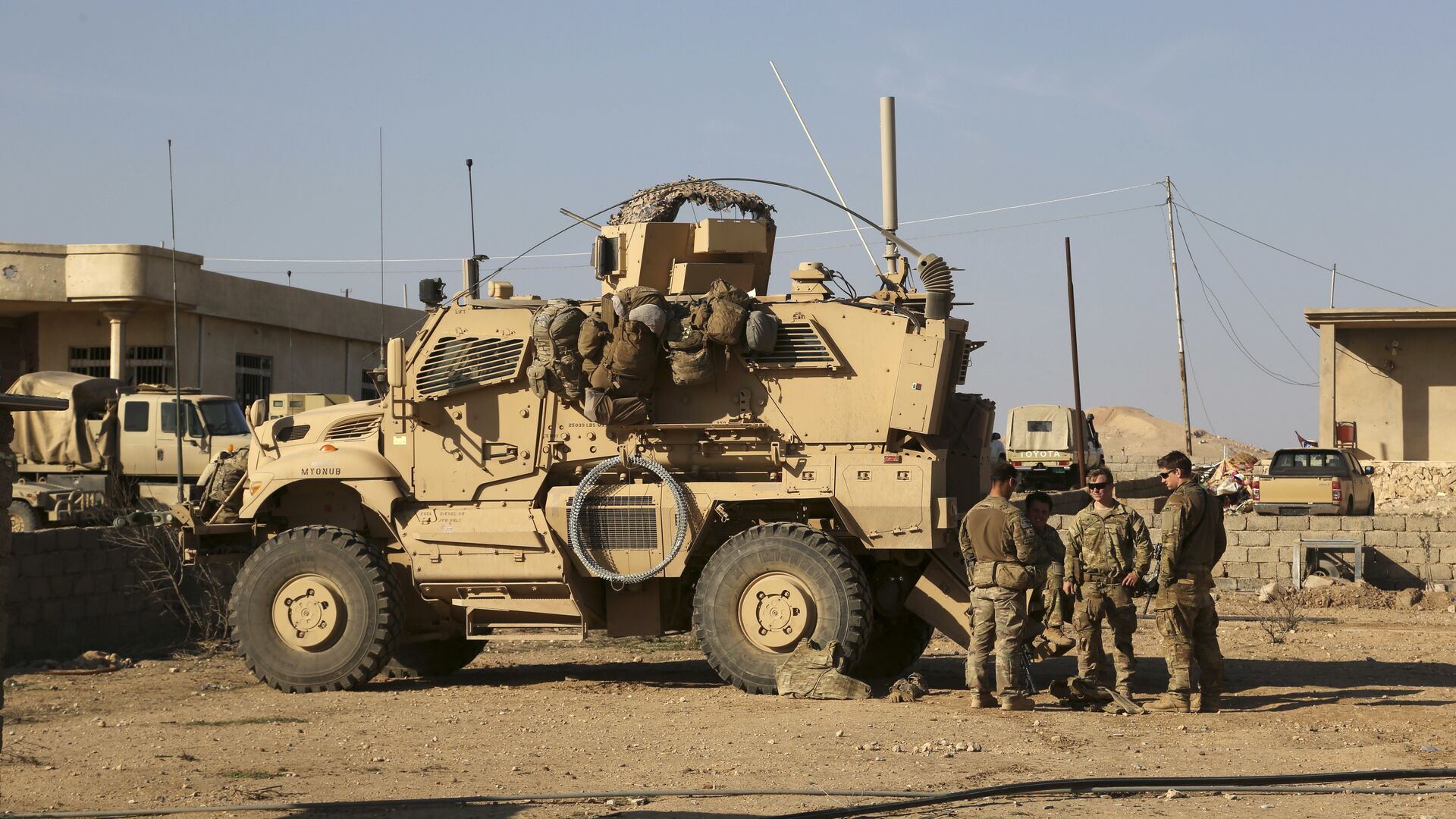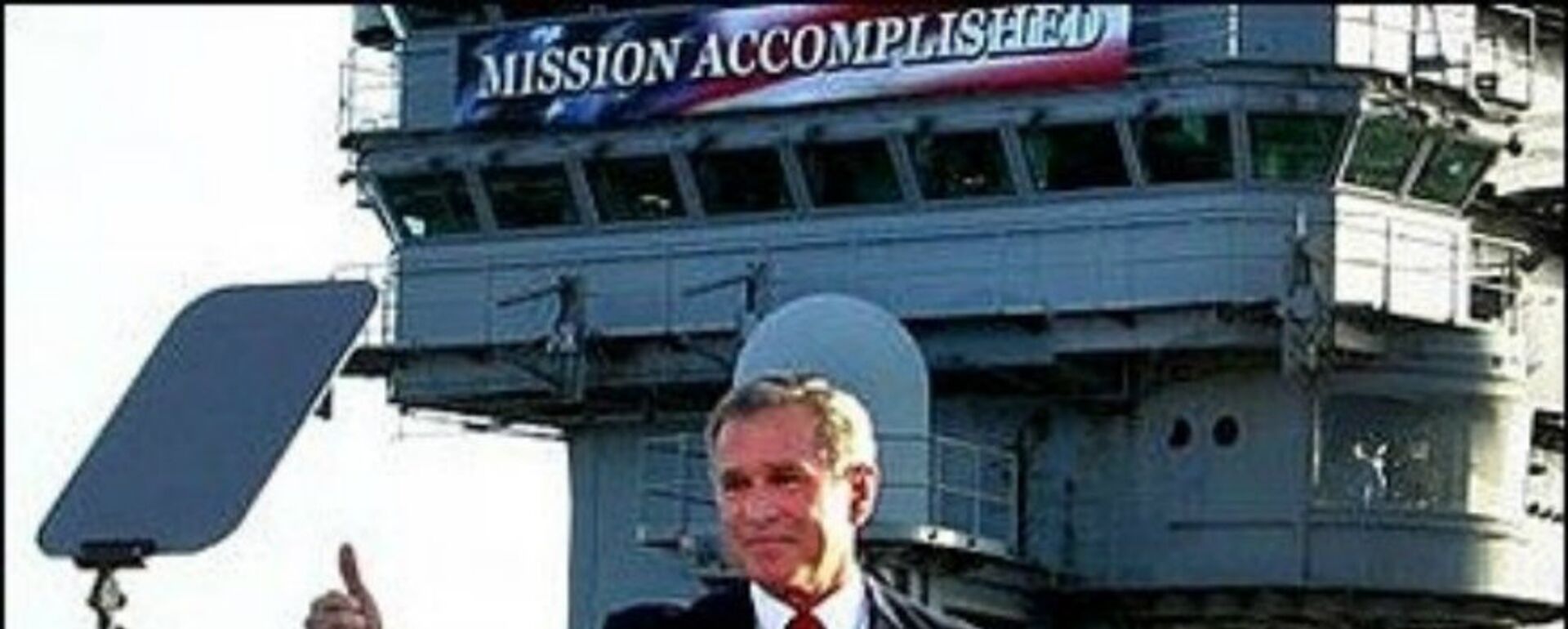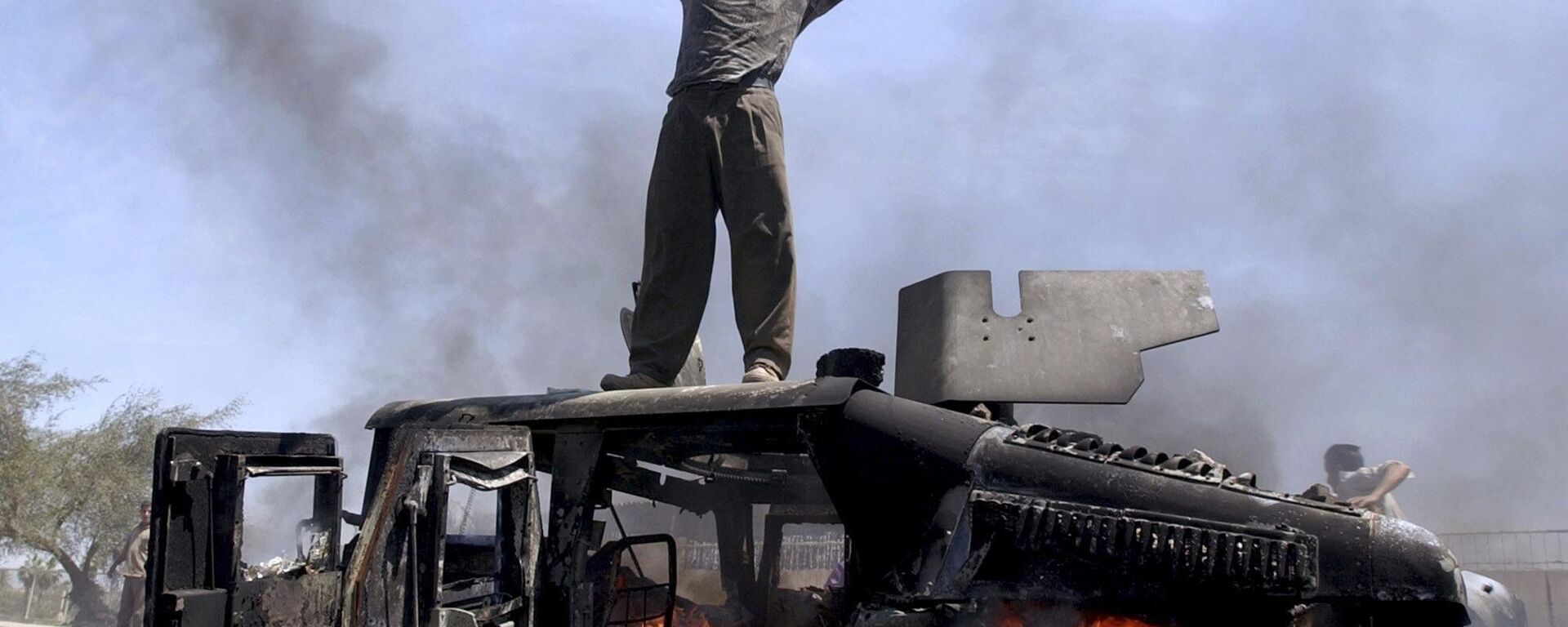https://sputnikglobe.com/20230320/ex-iranian-deputy-ambassador-to-iraq-us-has-destroyed-all-iraqs-infrastructure-1108597938.html
Ex-Iranian Deputy Ambassador to Iraq: ‘US Has Destroyed All Iraq's Infrastructure’
Ex-Iranian Deputy Ambassador to Iraq: ‘US Has Destroyed All Iraq's Infrastructure’
Sputnik International
Seyyed Mousa Alizadeh Tabatabaei, head of the MFA’s Directorate General of the Persian Gulf and Iran's former deputy ambassador to Baghdad, told Sputnik of the crimes committed by the Americans during the US invasion of Iraq and gave examples of the devastating consequences of the US military's disastrous actions in the country and the region.
2023-03-20T17:00+0000
2023-03-20T17:00+0000
2023-03-20T17:00+0000
20 years since us invasion of iraq
iraq
iraq war
2003 invasion of iraq
iraq war
war in iraq
us
https://cdn1.img.sputnikglobe.com/img/105201/12/1052011277_0:300:5760:3540_1920x0_80_0_0_1af603593b8cb807e81132fe66f033bc.jpg
Speaking of the reasons for the US invasion of Iraq, it should be noted that there were a number of obvious justifications given by America and its allies, and a number of real and unclear objectives that served as the main reasons for the attack. As for the stated US reasons for the invasion, ie the presence of weapons of mass destruction (WMD), first of all, the American and British public had serious doubts about this matter, which was reflected in mass anti-war demonstrations in England and even in the American media and in some feature films and documentaries.Of course, for many analysts, the illusory nature of the US reasoning was obvious even before the invasion. After more than a decade of tight encirclement and foreign intelligence infiltration of Iraq, the US leadership and its Western allies knew for a fact that there were no WMD in Iraq at that time. After numerous inspections, UN inspectors also confirmed this.It should be noted that during the war unleashed by Iraq against Iran, Saddam repeatedly used chemical weapons against the Iraqi people and Iranian citizens. Then there was no reaction from the major world powers. And this is because the main source of supply of these weapons was Western countries.This time the US needed a good reason to deceive global public opinion. After making sure that there were no WMD in Iraq, the US invaded Iraq under the pretext of their presence and accusing Saddam of having links with al-Qaeda*. It seems that the US and Britain were guided by a strategy of destroying the infrastructure of the Middle Eastern countries.These two countries have been pursuing this strategy in our region since at least the Second World War, first, to prevent economic stability and growth, and second, to maintain their influence and protect their economic and political interests. There are several examples of such interference and illegal actions. These include the coup against the legitimate government of Mohammad Mosaddegh in Iran, the organization of continued coups in the Middle East and Arab countries, the war unleashed by the Saddam regime against Iran, the invasion of Kuwait by this regime, and dozens of other examples.In all of these cases, we see the destruction of regional infrastructure, political instability, chaos, and the waste of human resources, leading to the slowing down and even halting of growth and development in these countries. The most recent examples are the events in Libya and the outbreak of civil war in Syria.According to Alizadeh Tabatabaei, the devastating effects of such interventions have continued long after the war and occupation:“As deputy ambassador of the Islamic Republic of Iran to Iraq, I witnessed how the United States destroyed the entire infrastructure of that country during its invasion and occupation. And because of this, today - 20 years later - despite the availability of oil and other abundant natural resources, the Iraqi people face many problems in catering for their basic needs. Even in Baghdad, people suffer from water and electricity cuts for several hours a day and night. Despite high US military spending in Iraq - and contrary to US statements about rebuilding Iraq - the Americans have not even built a factory to produce powdered milk for Iraqi children. The US has also prevented the import of electricity and gas from Iran.”Alizadeh Tabatabaei cited not only the emergence of Daesh** but also the loss of American hegemony in the region as one of the major consequences of the US invasion of Iraq.The result of the US invasion, in addition to the material and moral cost to the people of Iraq, has been an increase in tension in the region, human and financial losses, and the displacement of many people in the region. Among the major consequences: the emergence of Daesh in the region; the killing of civilians by the US Army; gross human rights violations by the US (as we have seen in Abu Ghraib and other places in Iraq); the humanitarian crisis and displacement of millions; the destruction of Iraq's economic infrastructure; and the costs of a long war being imposed on American taxpayers as well as on regional American allies.The former Iranian diplomat emphasized that the cost of the US invasion of Iraq is incalculable:“Undoubtedly, because of the dominance of American media, Americans will never know the extent of the real damage caused by their actions and other follies of their government. The US has a long history of covering up real events and misleading people. And it is not just about Iraq, but also about Vietnam and Afghanistan. The US has tried its best to hide the facts of war everywhere. But among the stated and irrefutable evidence, we can mention the report of the US Budget Committee for last year, in which the material cost of the US war in Iraq is estimated at $1.9 trillion. In addition, the memories of many about the war reflect the deaths of thousands of American soldiers, the mental and psychological effects of the war on the American military and on the families of the infantry soldiers, who were mostly from the American lower classes. Certainly, the list of overt and covert losses suffered by the American people because of this war could be very long. And it should be addressed.”Iran vehemently opposed the US attack on Iraq because the central principle of Iranian foreign policy is to oppose any foreign interference in determining the destiny of the peoples of the region, Alizadeh Tabatabaei added:We believe that the Iraqi people must make their own decisions about their destiny, and that the US is only interfering to create crises and exploit the wealth of the peoples of the region. America's objectives were clear to us: we saw the invasion of Iraq as a continuation of the US strategy in the region. The US had previously imposed a war on our country with Saddam's Iraq. The next step was the US intention to invade Iraq, and the Americans had given Saddam the green light to go to war with Kuwait.After the American aggression, we saw the damage done to the people of that country: thousands of Iraqis were killed, millions of innocent people were wounded and left homeless. But in my opinion, the saddest consequence of the US invasion of Iraq was the creation of the terrorist group Daesh, which, according to former US Secretary of State Hillary Clinton, was to a certain extent created by the United States. Everyone has seen the damage and destruction that Daesh has brought to the region."Realizing the magnitude of this catastrophe, Iran took wise measures that led to the failure of the American strategy. The courageous resistance of the region's young people under the leadership of General Qasem Soleimani led to the downfall of Daesh. And after the defeat of Daesh, the United States, which claimed to be fighting against the group, organized an attack in Iraq in violation of all international principles, which resulted in the death of Soleimani.”*Al-Qaeda is a terrorist organization banned in Russia and many other countries**Daesh (also known as ISIS/ISIL/IS/Islamic State) is a terrorist organization banned in Russia and many other countries.
https://sputnikglobe.com/20230320/twenty-years-later-us-still-struggling-with-anarchy-unleashed-by-iraq-invasion-1108580081.html
https://sputnikglobe.com/20230319/us-nurtured-plans-of-destroying-iraq-years-before-2003-invasion-ex-official-says-1108572318.html
iraq
Sputnik International
feedback@sputniknews.com
+74956456601
MIA „Rosiya Segodnya“
2023
Sputnik International
feedback@sputniknews.com
+74956456601
MIA „Rosiya Segodnya“
News
en_EN
Sputnik International
feedback@sputniknews.com
+74956456601
MIA „Rosiya Segodnya“
Sputnik International
feedback@sputniknews.com
+74956456601
MIA „Rosiya Segodnya“
us military's disastrous actions, crimes committed by the americans
us military's disastrous actions, crimes committed by the americans
Ex-Iranian Deputy Ambassador to Iraq: ‘US Has Destroyed All Iraq's Infrastructure’
Seyyed Mousa Alizadeh Tabatabaei, head of the MFA’s Directorate General of the Persian Gulf and Iran's former deputy ambassador to Baghdad, told Sputnik of the crimes committed by the Americans during the US invasion of Iraq and gave examples of the devastating consequences of the US military's disastrous actions in the country and the region.
Speaking of the reasons for the US invasion of Iraq, it should be noted that there were a number of obvious justifications given by America and its allies, and a number of real and unclear objectives that served as the main reasons for the attack. As for the stated US reasons for the invasion, ie
the presence of weapons of mass destruction (WMD), first of all, the American and British public had serious doubts about this matter, which was reflected in
mass anti-war demonstrations in England and even in the American media and in some feature films and documentaries.
Of course, for many analysts, the illusory nature of the US reasoning was obvious even before
the invasion. After more than a decade of tight encirclement and foreign intelligence infiltration of Iraq, the
US leadership and its Western allies knew for a fact that there were no WMD in Iraq at that time. After numerous inspections, UN inspectors also confirmed this.
It should be noted that during the war unleashed by Iraq against Iran, Saddam repeatedly used chemical weapons against the Iraqi people and Iranian citizens. Then there was no reaction from the major world powers. And this is because the main source of supply of these weapons was Western countries.
This time the US needed a good reason to deceive global public opinion. After making sure that there were no WMD in Iraq, the US invaded Iraq under the pretext of their presence and accusing Saddam of having links with al-Qaeda*. It seems that the US and Britain were guided by a strategy of destroying the infrastructure of the Middle Eastern countries.
These two countries have been pursuing this strategy in our region since at least the Second World War, first, to prevent economic stability and growth, and second, to maintain their influence and protect their economic and political interests. There are several examples of such interference and illegal actions. These include the coup against the legitimate government of Mohammad Mosaddegh in Iran, the organization of continued coups in the Middle East and Arab countries, the war unleashed by the Saddam regime against Iran, the invasion of Kuwait by this regime, and dozens of other examples.
In all of these cases, we see the destruction of regional infrastructure, political instability, chaos, and the waste of human resources, leading to the slowing down and even halting of growth and development in these countries. The most recent examples are the events in Libya and the outbreak of civil war in Syria.
According to Alizadeh Tabatabaei, the devastating effects of such interventions have continued long after the war and occupation:
“As deputy ambassador of the Islamic Republic of Iran to Iraq, I witnessed how the United States destroyed the entire infrastructure of that country during its invasion and occupation. And because of this, today - 20 years later - despite the availability of oil and other abundant natural resources, the Iraqi people face many problems in catering for their basic needs. Even in Baghdad, people suffer from water and electricity cuts for several hours a day and night. Despite high US military spending in Iraq - and contrary to US statements about rebuilding Iraq - the Americans have not even built a factory to produce powdered milk for Iraqi children. The US has also prevented the import of electricity and gas from Iran.”
Alizadeh Tabatabaei cited not only the emergence of Daesh** but also the loss of American hegemony in the region as one of the major consequences of the US invasion of Iraq.
The result of the US invasion, in addition to the material and moral cost to the people of Iraq, has been an increase in tension in the region, human and financial losses, and the displacement of many people in the region. Among the major consequences: the emergence of Daesh in the region; the killing of civilians by the US Army; gross human rights violations by the US (as
we have seen in Abu Ghraib and other places in Iraq); the humanitarian crisis and displacement of millions; the destruction of Iraq's economic infrastructure; and the costs of a long war being imposed on American taxpayers as well as on regional American allies.
"Of course, there have been some positive consequences: First, the loss of American hegemony in the region and the fact that people now know the true nature of the United States and the real reasons for its interference, which has increased the negative feelings of the people of the region towards the American government and caused irreparable damage to the United States' reputation."
The former Iranian diplomat emphasized that the cost of the US invasion of Iraq is incalculable:
“Undoubtedly, because of the dominance of American media, Americans will never know the extent of the real damage caused by their actions and other follies of their government. The US has a long history of covering up real events and misleading people. And it is not just about Iraq, but also about Vietnam and Afghanistan. The US has tried its best to hide the facts of war everywhere. But among the stated and irrefutable evidence, we can mention the report of the US Budget Committee for last year, in which the material cost of the US war in Iraq is estimated at $1.9 trillion. In addition, the memories of many about the war reflect the deaths of thousands of American soldiers,
the mental and psychological effects of the war on the American military and on the families of the infantry soldiers, who were mostly from the American lower classes. Certainly, the list of overt and covert losses suffered by the American people because of this war could be very long. And it should be addressed.”
Iran vehemently opposed the US attack on Iraq because the central principle of Iranian foreign policy is to oppose any foreign interference in determining the destiny of the peoples of the region, Alizadeh Tabatabaei added:
We believe that the Iraqi people must make their own decisions about their destiny, and that the US is only interfering to create crises and exploit the wealth of the peoples of the region. America's objectives were clear to us: we saw the invasion of Iraq as a continuation of the US strategy in the region. The US had previously imposed a war on our country with Saddam's Iraq. The next step was the US intention to invade Iraq, and the Americans had given Saddam the green light to go to war with Kuwait.
After the American aggression, we saw the damage done to the people of that country: thousands of Iraqis were killed, millions of innocent people were wounded and left homeless. But in my opinion, the saddest consequence of the US invasion of Iraq was the creation of the terrorist group Daesh, which, according to former US Secretary of State Hillary Clinton, was to a certain extent created by the United States. Everyone has seen the damage and destruction that Daesh has brought to the region.
"Realizing the magnitude of this catastrophe, Iran took wise measures that led to the failure of the American strategy. The courageous resistance of the region's young people under the leadership of General Qasem Soleimani led to the downfall of Daesh. And after the defeat of Daesh, the United States, which claimed to be fighting against the group, organized an attack in Iraq in violation of all international principles, which resulted in the death of Soleimani.”
*Al-Qaeda is a terrorist organization banned in Russia and many other countries
**Daesh (also known as ISIS/ISIL/IS/Islamic State) is a terrorist organization banned in Russia and many other countries.






